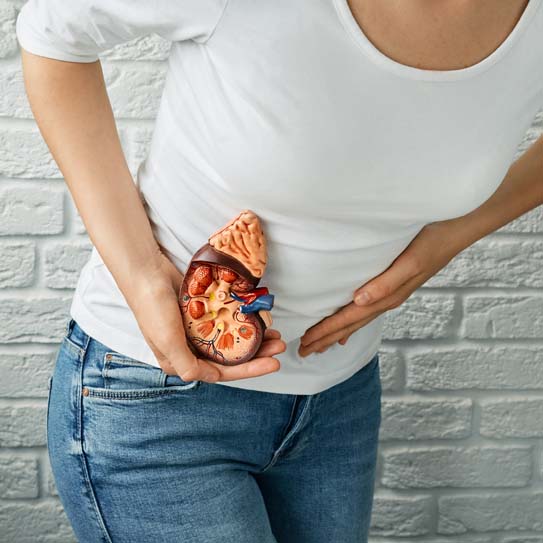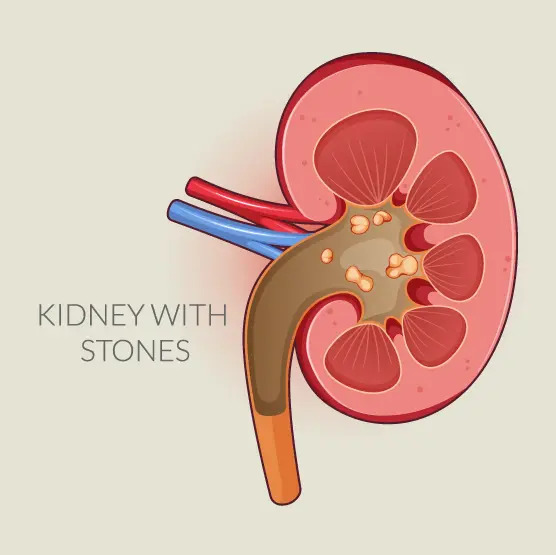
Daund
USFDA-Approved Procedures
Support in Insurance Claim
No-Cost EMI
1-day Hospitalization


Kidney Stones Treatment in Daund
The urologists at Pristyn Care are highly experienced in conducting a thorough diagnosis for kidney stones. The diagnosis may include a physical examination, in which the doctor will ask about your medical history and current medication if you are taking any. However, to detect the underlying cause, the doctor would recommend a few diagnostic tests:
After the results of the diagnosis, the doctor will initiate and advise the best-suited kidney stones treatment according to the condition.
You can visit our best kidney stone specialists in Daund and and nearby cities such as Gurgaon, Noida, Faridabad, Ghaziabad, and Manesar.
| Surgery Type | Description | Procedure | Recovery Time |
|---|---|---|---|
| Extracorporeal Shock Wave Lithotripsy (ESWL) | Non-invasive procedure using shock waves to break up stones. | Patient lies on a table, and shock waves are directed at the stone. | Usually return to normal activities within a day. |
| Ureteroscopy (URSL) | A thin, flexible tube (ureteroscope) is used to remove or break up stones. | Ureteroscope inserted through the urinary tract to reach the stone. | Typically, a few days to a week. |
| Percutaneous Nephrolithotomy (PCNL) | Minimally invasive procedure to remove large stones. | A small incision is made in the back, and a nephroscope is used to access and remove the stone. | Several days to a week. |
| Open Surgery (Nephrolithotomy) | Traditional surgical approach for large or complex stones. | Surgeon makes an incision in the abdomen or side to directly access and remove the stone. | Several weeks to full recovery. |
| Laparoscopic Surgery | Minimally invasive technique using small incisions and a camera. | Small incisions made for camera and surgical instruments to remove or break up stones. | A few days to a couple of weeks. |
Delivering Seamless Kidney Stone Surgical Experience
We offer treatment through various non-invasive and minimally-invasive methods, including RIRS, ESWL, PCNL, etc., to ensure patients' comfort by reducing complications and downtime.
We are associated with the top hospitals in the city. This lets our doctors provide the best treatments for kidney stones using the most cutting-edge technology and ensure the best treatment outcomes. Our associated hospitals are well-equipped with all the facilities that the patients may need for a hassle-free treatment journey.
Our team consists of the best urologists in the city, who are highly trained in treating even the most complex cases of kidney stones. They have 8+ years of experience in providing effective diagnosis and treatment for kidney stones.
We accept all insurance for kidney stone treatment. We also have a dedicated insurance team to assist patients throughout the insurance claim procedure and make the process smooth for the patients.
Kidney stones have various complications. Further delaying kidney stone removal can lead to kidney damage or even permanent failure.
Kidney stones usually do not interfere with conception. So you can get pregnant if you have kidney stones. However, if the stones are too large to pass naturally, they can increase the risk of premature labor and C-sections. Therefore, you must get them treated at the earliest possible.
Pristyn Care is one of the best kidney stone clinics in Daund. The clinic has placed the highest standards of covid-19 preventive measures to ensure the safety of every patient and medical staff. The clinics are easily accessible from all the major parts of Daund. The best urologists work in the clinics to provide kidney stone treatment. To consult with a good doctor for treatment of kidney stones, get in touch with Pristyn Care medical coordinator.
Knowing the type of kidney stone is necessary to determine the best line of treatment and reduce the risk of getting the stones again in the future. Following are the different types of kidney stones:
Calcium stones – These are the most common type of kidney stones a person may develop. Calcium stones form due to deposits of calcium oxalate. Causes of calcium stones include high amounts of vitamin D, ill-dietary habits, intestinal bypass surgery, and metabolic disorders.
Struvite stones – Struvite stones may form from a urinary tract infection. These stones grow faster than any other type and do not show any symptoms in most cases.
Uric acid stones – These stones often form when people lose too much water from their bodies due to conditions like chronic diarrhea. They can also form when a person’s protein intake is too high. Genetic factors like diabetes can also be a reason for uric acid stones.
Cystine stones – People with a hereditary disorder called cystinuria can develop kidney stones. Cystinuria is a condition in which the kidneys excrete too much amino acid.
There are three easy ways to book an appointment with the best urologist for kidney stones surgery at Pristyn Care:
Kidney stones or renal calculi occur in different shapes or sizes depending on how long they are present in the body. Sometimes, these renal stones are minute and get flushed out through urine without medications or therapies. However, some stones can be stubborn and keep on accumulating over a period of time. Renal stones of such stubborn nature often obstruct ureteral passage or even form staghorn calculus. Some of the treatment options for kidney stones are as below-
Non-surgical methods – When the size of the stone is less than 5mm, urologists usually recommend non-surgical procedures for removing kidney stones. These may include home remedies, therapeutic medicines, medications such as pain-relievers, etc., that can help flush out kidney stones. The doctors usually recommend drinking excess water and staying hydrated to increase the fluid concentration in the urine. Several medications for kidney stones include –
In addition, the doctor may recommend some alpha-blockers such as tamsulosin (Flomax), dutasteride, etc., that can help the muscles in your ureter relax, making it easier for you to pass the stone quickly and with less pain.
.svg)
.svg)
.svg)